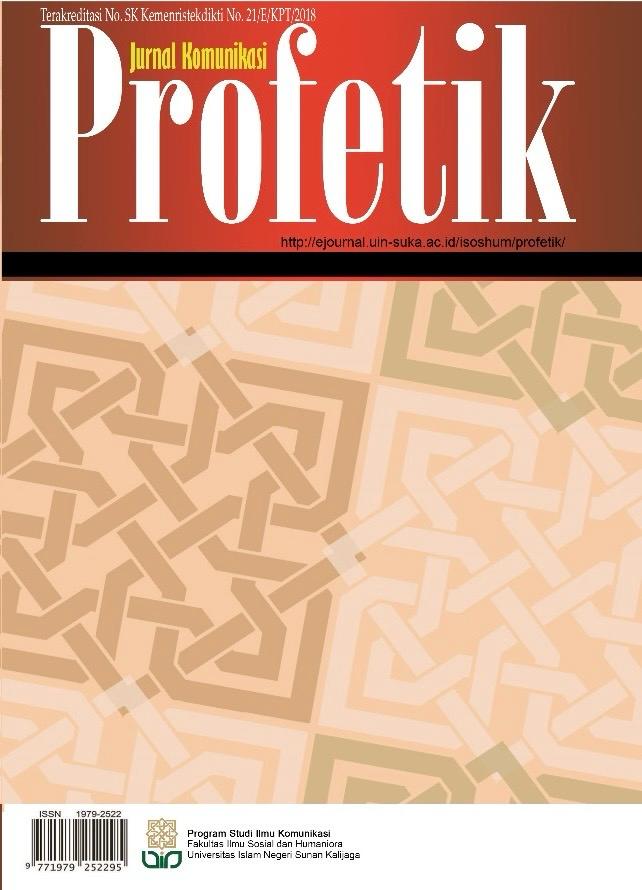Between Norm and Practice: Dynamics of Muhammadiyah Political Communications
Main Article Content
Abstract
This study aims to describe the dynamics of Muhammadiyah political communication. The research is based on the background that Muhammadiyah is a civil society organization engaged in the socio-religious field in Indonesia and is non-political, but has political power. Muhammadiyah's political communication is studied within the framework of the theory of "social practices" developed by Anthony Giddens, and the theory of Social Reality Construction Analysis by Berger & Luckmann. The research method was carried out qualitatively with a constructive approach. The research data was obtained through official organizational documents and in-depth interviews. The results of the study show that the normativity of Muhammadiyah political communication is rooted in Muhammadiyah ideology which originates from the Al-Qur'an and as-Sunnah, and is transformed into religious understanding, social praxis, and its political communication strategy. Muhammadiyah's political communication strategy is mapped out in three forms of strategy, namely the political communication strategy of faith and good deeds, the strategy of political communication of power structure, and the strategy of national cultural political communication. The three Muhammadiyah political communication strategies work collaboratively so they are referred to as the Collaborative Political Communication Model.
Article Details
License
Please find the rights and licenses in Profetik: Jurnal Komunikasi by submitting the article/manuscript of the article, the author(s) agree with this policy. No specific document sign-off is required.
1. License
The non-commercial use of the article will be governed by the Creative Commons Attribution license as currently displayed on Creative Commons Attribution-NonCommercial 4.0 International License

2. Author(s)' Warranties
The author warrants that the article is original, written by stated author(s), has not been published before, contains no unlawful statements, does not infringe the rights of others, is subject to copyright that is vested exclusively in the author and free of any third party rights, and that any necessary written permissions to quote from other sources have been obtained by the author(s).
3. User/Public Rights
Profetik's spirit is to disseminate articles published are as free as possible. Under the Creative Commons license, Profetik permits users to copy, distribute, display, and perform the work for non-commercial purposes only. Users will also need to attribute authors and Profetik on distributing works in the journal and other media of publications. Unless otherwise stated, the authors are public entities as soon as their articles got published.
4. Rights of Authors
Authors retain all their rights to the published works, such as (but not limited to) the following rights;
Copyright and other proprietary rights relating to the article, such as patent rights, The right to use the substance of the article in own future works, including lectures and books, The right to reproduce the article for own purposes, The right to self-archive the article (please read out deposit policy), The right to enter into separate, additional contractual arrangements for the non-exclusive distribution of the article's published version (e.g., post it to an institutional repository or publish it in a book), with an acknowledgment of its initial publication in this journal (Profetik: Jurnal Komunikasi).
5. Co-Authorship
If the article was jointly prepared by more than one author, any authors submitting the manuscript warrants that he/she has been authorized by all co-authors to be agreed on this copyright and license notice (agreement) on their behalf, and agrees to inform his/her co-authors of the terms of this policy. Profetik will not be held liable for anything that may arise due to the author(s) internal dispute. Profetik will only communicate with the corresponding author.
6. Royalties
Being an open accessed journal and disseminating articles for free under the Creative Commons license term mentioned, author(s) aware that Profetik entitles the author(s) to no royalties or other fees.
7. Miscellaneous
Profetik will publish the article (or have it published) in the journal if the article’s editorial process is successfully completed. Profetik's editors may modify the article to a style of punctuation, spelling, capitalization, referencing and usage that deems appropriate. The author acknowledges that the article may be published so that it will be publicly accessible and such access will be free of charge for the readers as mentioned in point 3.
